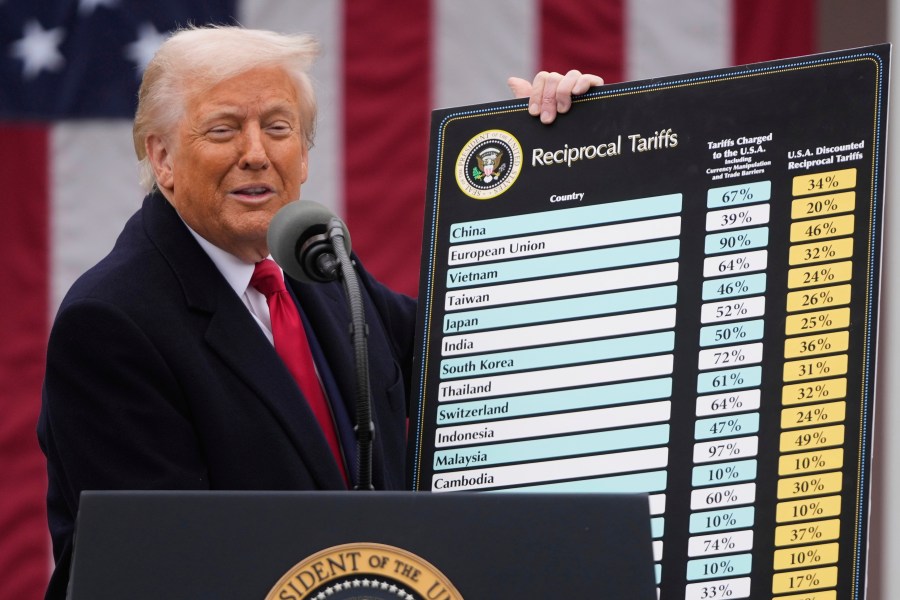World
Supreme Court Weighs Trump’s Tariffs Amid Legal Challenges

The U.S. Supreme Court is set to make a landmark decision regarding former President Donald Trump’s controversial tariffs, which have been ruled illegal by three lower courts. This case marks the first time the Supreme Court will render a final judgment on a policy implemented by Trump, whose administration has relied heavily on tariffs as a cornerstone of its economic and foreign policy.
The arguments being presented before the justices on September 27, 2023, represent a significant moment in U.S. economic history. Trump’s tariffs, which have generated approximately $195 billion in revenue to date, are projected to yield an estimated $3 trillion over the next decade. The outcome could have profound implications for both political dynamics and the economy.
Tariffs function as taxes imposed on imported goods, which are ultimately borne by consumers through increased prices. Trump has asserted his authority to impose these tariffs under the International Emergency Economic Powers Act, claiming national emergencies related to immigration and trade deficits as justifications. In February, he first invoked this law to target Canada, Mexico, and China, asserting that their failure to address illegal immigration warranted such measures.
Legal challenges against Trump’s tariffs have been spearheaded by libertarian-backed businesses and states. These challenges have seen success in multiple courts, including a specialized trade court and a district court in Washington, D.C. The courts determined that Trump could not substantiate his tariffs under the emergency powers law, which does not explicitly mention tariffs as a permissible action. Nonetheless, the tariffs remained in effect during ongoing litigation.
The U.S. Court of Appeals for the D.C. Circuit utilized the “major questions” doctrine, a legal principle requiring clear congressional authorization on issues of significant economic and political importance. This doctrine previously played a role in striking down several initiatives from President Joe Biden related to the COVID-19 pandemic. The stakes in the tariff case are notably higher, given the substantial revenue implications.
As the legal proceedings unfold, the challengers have referenced past writings from Justices Amy Coney Barrett, Neil Gorsuch, and Brett Kavanaugh. Barrett has articulated that significant financial decisions, such as imposing tariffs, require explicit permission from Congress. She likened the situation to a babysitter taking children on a costly amusement park trip without parental consent, emphasizing the need for clarity in such substantial matters.
Despite this, Kavanaugh has indicated that foreign policy and national security issues might not be subject to the same restrictions. A dissenting appellate judge also noted that the emergency powers law grants presidents broader authority to act without immediate congressional approval.
Some businesses involved in the case are advancing an argument that Congress has unconstitutionally delegated its taxing authority to the president. This nondelegation principle has not been invoked in nearly a century but could gain traction given recent sentiments expressed by Gorsuch, who has critiqued Congress for transferring legislative power to the executive branch.
The Supreme Court’s decision is anticipated to be expedited, as it agreed to hear the case in September, with arguments scheduled less than two months later. High-profile cases typically require extensive deliberation, but the court can act swiftly when necessary. A recent example includes a unanimous ruling regarding TikTok, which was decided just a week after hearing arguments.
With critical implications for U.S. trade policy and economic strategy, the Supreme Court’s ruling on Trump’s tariffs will likely resonate throughout the nation, potentially reshaping the landscape of presidential powers and congressional authority in economic matters.
-

 Lifestyle3 months ago
Lifestyle3 months agoLibraries Challenge Rising E-Book Costs Amid Growing Demand
-

 Sports3 months ago
Sports3 months agoTyreek Hill Responds to Tua Tagovailoa’s Comments on Team Dynamics
-

 Sports3 months ago
Sports3 months agoLiverpool Secures Agreement to Sign Young Striker Will Wright
-

 Lifestyle3 months ago
Lifestyle3 months agoSave Your Split Tomatoes: Expert Tips for Gardeners
-

 Lifestyle3 months ago
Lifestyle3 months agoPrincess Beatrice’s Daughter Athena Joins Siblings at London Parade
-

 World3 months ago
World3 months agoWinter Storms Lash New South Wales with Snow, Flood Risks
-

 Science3 months ago
Science3 months agoTrump Administration Moves to Repeal Key Climate Regulation
-

 Science2 months ago
Science2 months agoSan Francisco Hosts Unique Contest to Identify “Performative Males”
-

 Business3 months ago
Business3 months agoSoFi Technologies Shares Slip 2% Following Insider Stock Sale
-

 Science3 months ago
Science3 months agoNew Tool Reveals Link Between Horse Coat Condition and Parasites
-

 Sports3 months ago
Sports3 months agoElon Musk Sculpture Travels From Utah to Yosemite National Park
-

 Science3 months ago
Science3 months agoNew Study Confirms Humans Transported Stonehenge Bluestones









